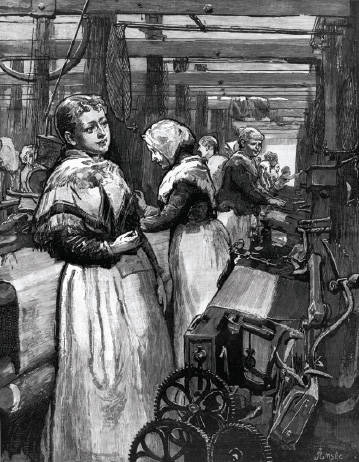PORTRAIT Ellen Johnston, Factory Worker and Poet
Born around 1835 to a working-class family in an industrializing Scotland, Ellen Johnston worked in a variety of textile mills throughout her life, lived as a single mother, and most unusually became a published poet with a modest local reputation. Through her brief autobiography and her poetry, we can catch a glimpse of one working-class woman’s experience during Britain’s Industrial Revolution.21

Shortly after her birth, Ellen’s father, a stonemason, decided to emigrate to America. Her mother, however, refused to join him and returned to her father’s house with her young daughter, where she supported her small family as a dressmaker. Ellen remembered those early years with pleasure, wandering the area with her doll and her dog. When she was eight, her mother remarried an abusive man, who forced young Ellen into factory work a few years later. “No language can paint the suffering,” she wrote about her stepfather, “which I afterwards endured from my tormentor.” She repeatedly ran away from his home and entered into a love affair that left her a single mother at age seventeen. Nonetheless, in a time of expanding literacy, Ellen read widely, calling herself a “self-taught scholar.” She especially liked to read “love adventures” and developed a romantic image of herself as a “heroine of the modern style.” She also began to write poetry for the “penny press,” inexpensive newspapers of the region.
Ellen’s troubled home life made her resistant to the emerging ideology of domesticity, which defined women’s roles as tranquil homemakers, wives, and mothers, a view that was taking hold even within the working classes by the mid-nineteenth century. “Fallen women”—those who gave birth outside of marriage—were considered beyond the confines of “true womanhood” and were generally expected to withdraw from public life in disgrace. Ellen Johnston, however, was unrepentant. “I did not . . . feel inclined to die,” she wrote, “when I could no longer conceal what the world falsely calls a woman’s shame.” Descriptions of home life in her writing are almost always negative. Referring to her aunt’s marriage to an alcoholic, she wrote: “Now the dark cup of sorrow embitters thy life / To a hard hearted drunkard, ah! thou art a wife.”
Johnston supported herself and her daughter by working intermittently in the textile mills of industrial Scotland, occasionally withdrawing for health reasons or to write poetry that she signed as “the factory girl.” Through her poetry, Johnston made clear her awareness of the inequalities and exploitation of industrial life, writing in one poem: “It is the puir [poor] man’s hard-won toil that fills the rich man’s purse . . . / What care the gentry if they’re well, though all the poor would die.” Another poem urged unionization for boat builders and boilermakers.
In response to industrial misery, however, Johnston did not advocate for socialism or revolutionary upheaval. Rather, she implicitly called on the “master” of the mill to behave in a benevolent fashion toward his employees and to create within the factory a sense of community. At times she recited her poetry at factory-organized gatherings, sometimes toasting the owner: “May he still have wealth; may we still have health / To remain his servants of toil.”
On a personal level, this “factory girl” stood up for herself, at one point taking her foreman to court to recover a week’s wages when she was fired without notice. But it was within the factory, not the family, that Johnston found emotional and personal satisfaction. In the mills, she discovered camaraderie, an emotional and spiritual home, and a status higher than that of domestic labor, which was the lot of so many young working-class women. Celebrating one of the factories where she worked, Johnston proclaimed: “I would not leave thee, dear beloved place / A crown, a sceptre, or a throne to grace, / To be a queen—the nation’s flag unfurl—/ A thousand times I’d be a Factory Girl!”
Johnston had hoped to make her living as a poet and thus escape the poverty to which factory wages condemned her. She did receive occasional financial support from upper-class benefactors, including a small gift from Queen Victoria, and a published collection of her work appeared in 1867. She was, however, aware that both class and gender made it difficult for her to win acceptance among middle- and upper-class members of the literary establishment, a recognition expressed in her writing. “I am so small I cannot shine / Amidst the great that read my rhyme.” In 1870, only a year after the publication of the second edition of her book of poetry, she had to apply for “poor relief,” and in 1874, Ellen Johnston died in a Scottish poorhouse, not yet forty years of age.
Question
Question: How would you describe Ellen Johnston’s outlook on industrial Britain?